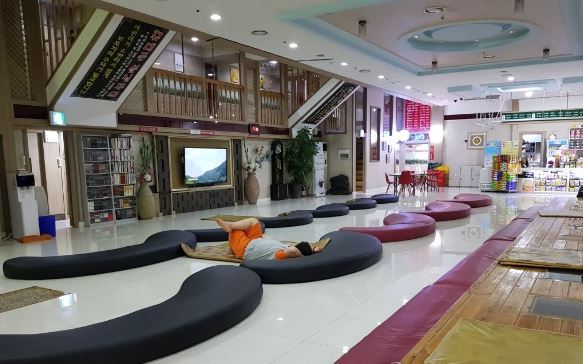The story of a teenager who was refused entry at a jjimjilbang after 10 p.m. even with written parental consent has sparked discussion on the internet.
The teen tweeted that the incident took place on Dec. 31 last year. By the Korean age system, the teen would turn 19 years old at midnight, one year short of the age that would not require parental consent. The teen is presumed to actually be 17 years old.
 |
The inside of an unrelated jjimjilbang is seen in this file photo. (Yonhap) |
According to the Twitter post, the teenager and four friends traveled to Gangwon Province to watch the first sunrise on New Year’s Day. They planned to stay overnight at a jjimjilbang, or public bathhouse, having come prepared with consent forms from their parents as required by the Korean Public Health Control Act. However, the five teens were refused entry by three jjimjilbang establishments despite the written consent forms, leaving them with no choice but to whittle away the late night and early morning at 24-hour convenience stores and fast food restaurants.
“Parental consent became invalid after the Gangneung accident,” said a staff member at one of the concerned jjimjilbang, according to the post.
A gas leak caused the death of three and left seven other students unconscious on Dec. 18 at their accommodations in Gangneung, Gangwon Province.
According to Sokcho authorities, some jjimjilbang businesses may be overreacting, as no new guidelines have yet been issued for minors seeking overnight accommodations.
The teen’s story quickly spread through Twitter, retweeted some 16,000 times as of press.
Some users commented that the owners of those facilities should focus more on the safety of their place of business, not stopping teens from using their facilities. Others brought up that some schools had summoned their high school seniors after the Gangneung incident for safety education. They asked why the students should be receiving safety education while facility owners themselves were not increasing safety.
Meanwhile a Seoul Metropolitan Office of Education official said the summoning of students was just an additional protective action taken by the schools to further improve safety, and not intended to put blame on the teens.
“When talking about accidents that happen to teenagers, our society tends to blame the students for not being under the control of parents or teachers rather than focusing on the actual cause of the accident,” said Gong Hyun, a teen rights activist. “These perceptions can restrict teenagers from becoming independent adults.”
By Kim Hye-soo (
clairek@heraldcorp.com)








